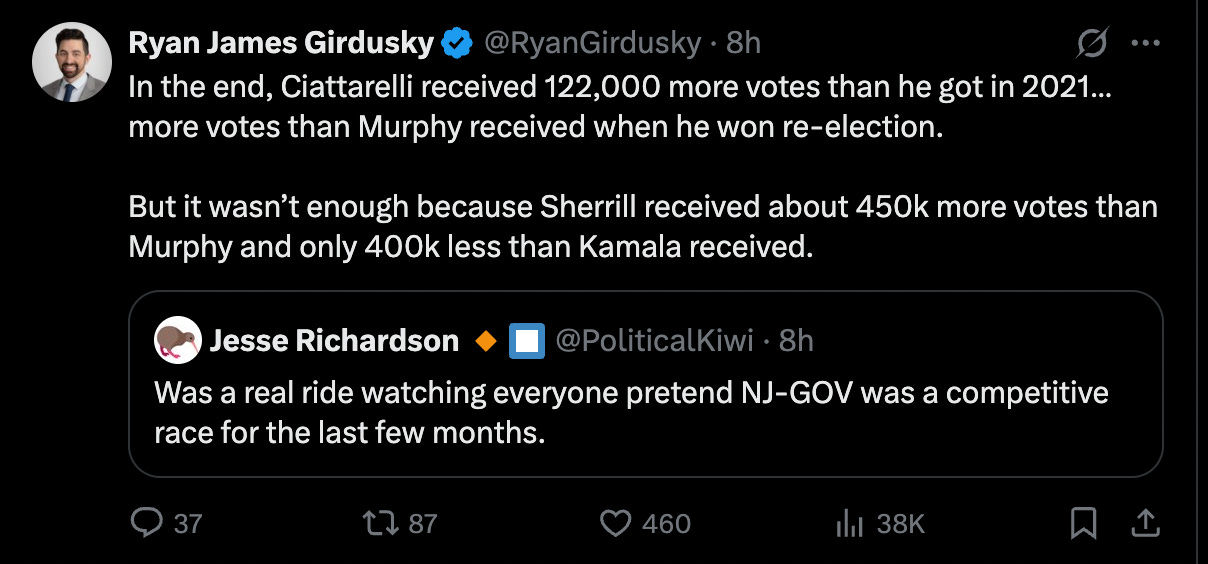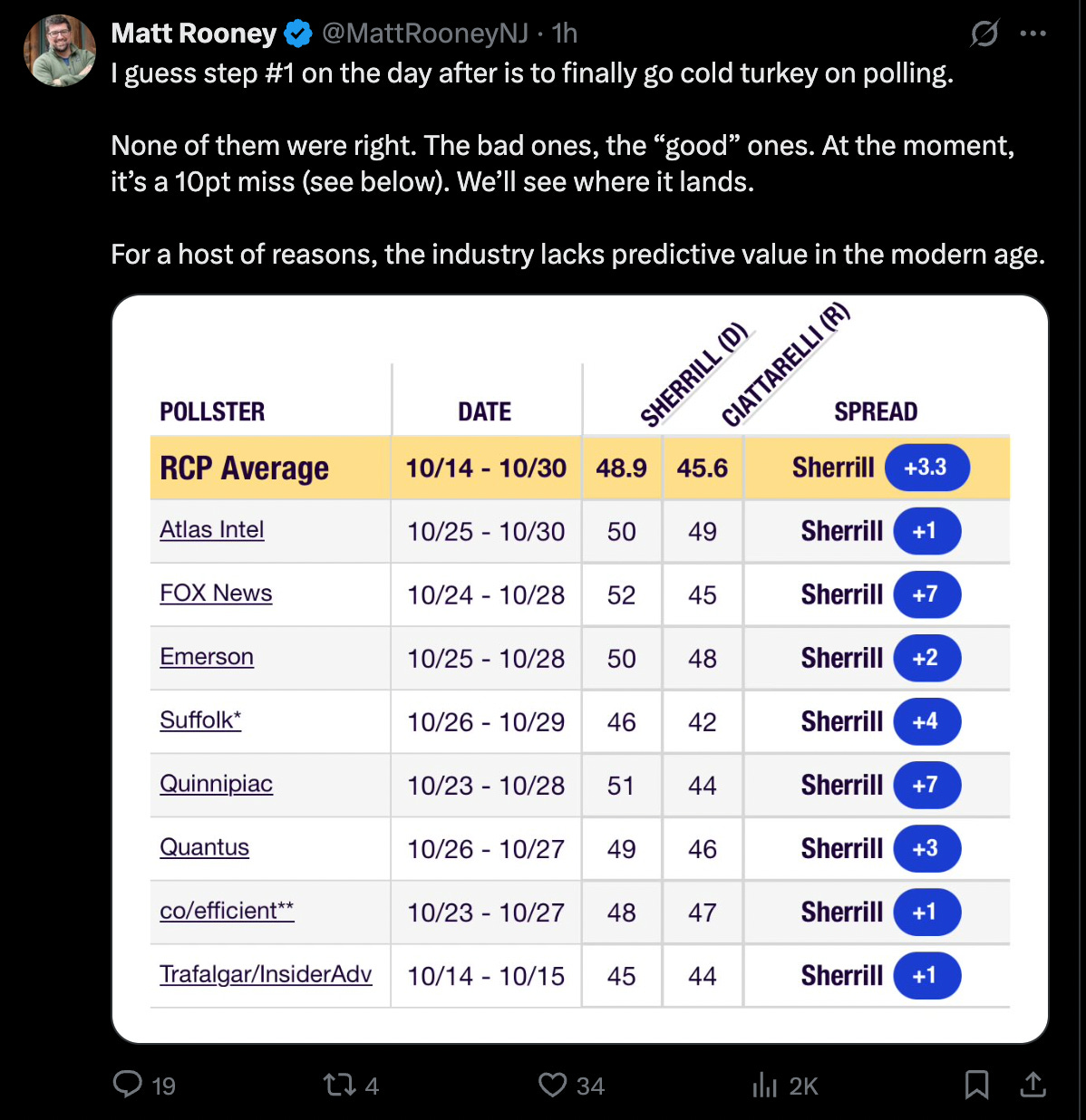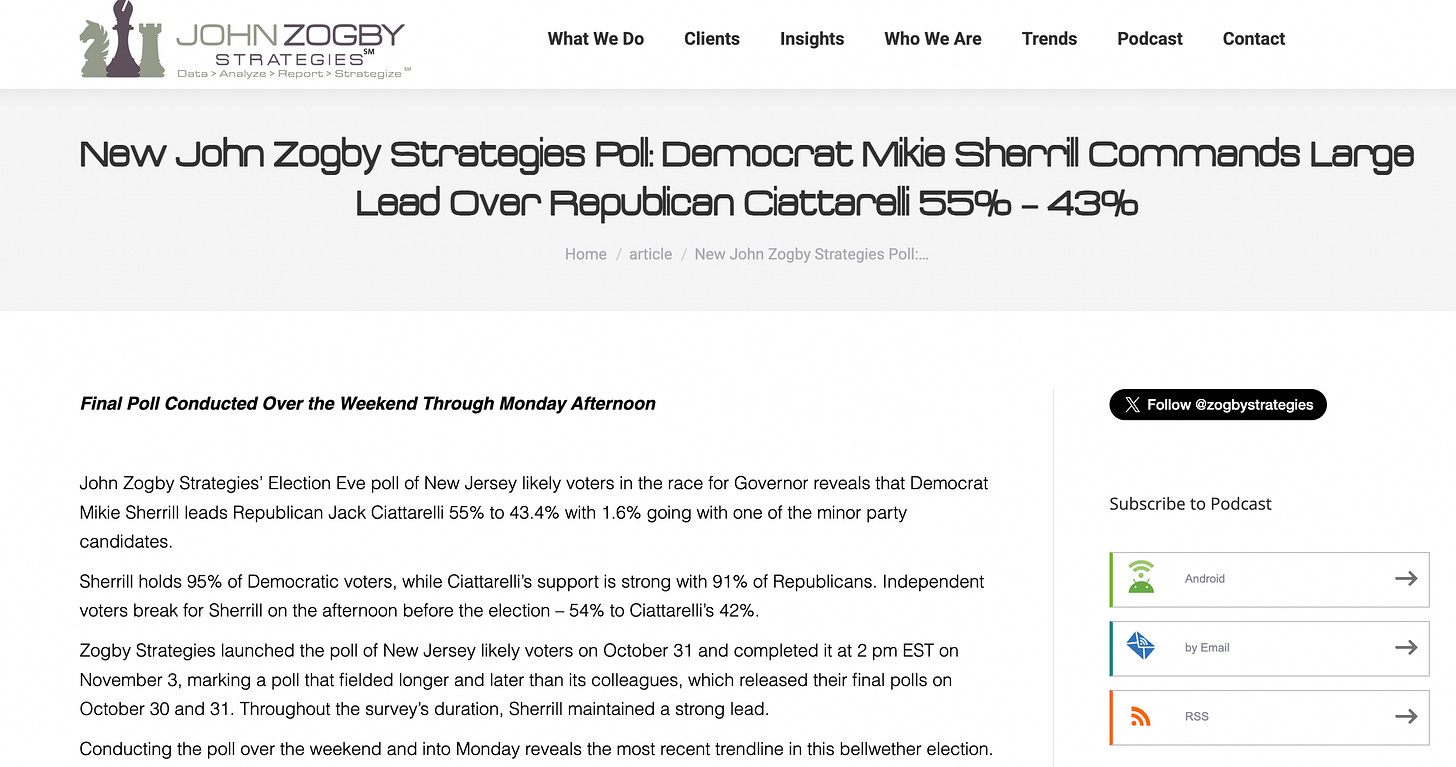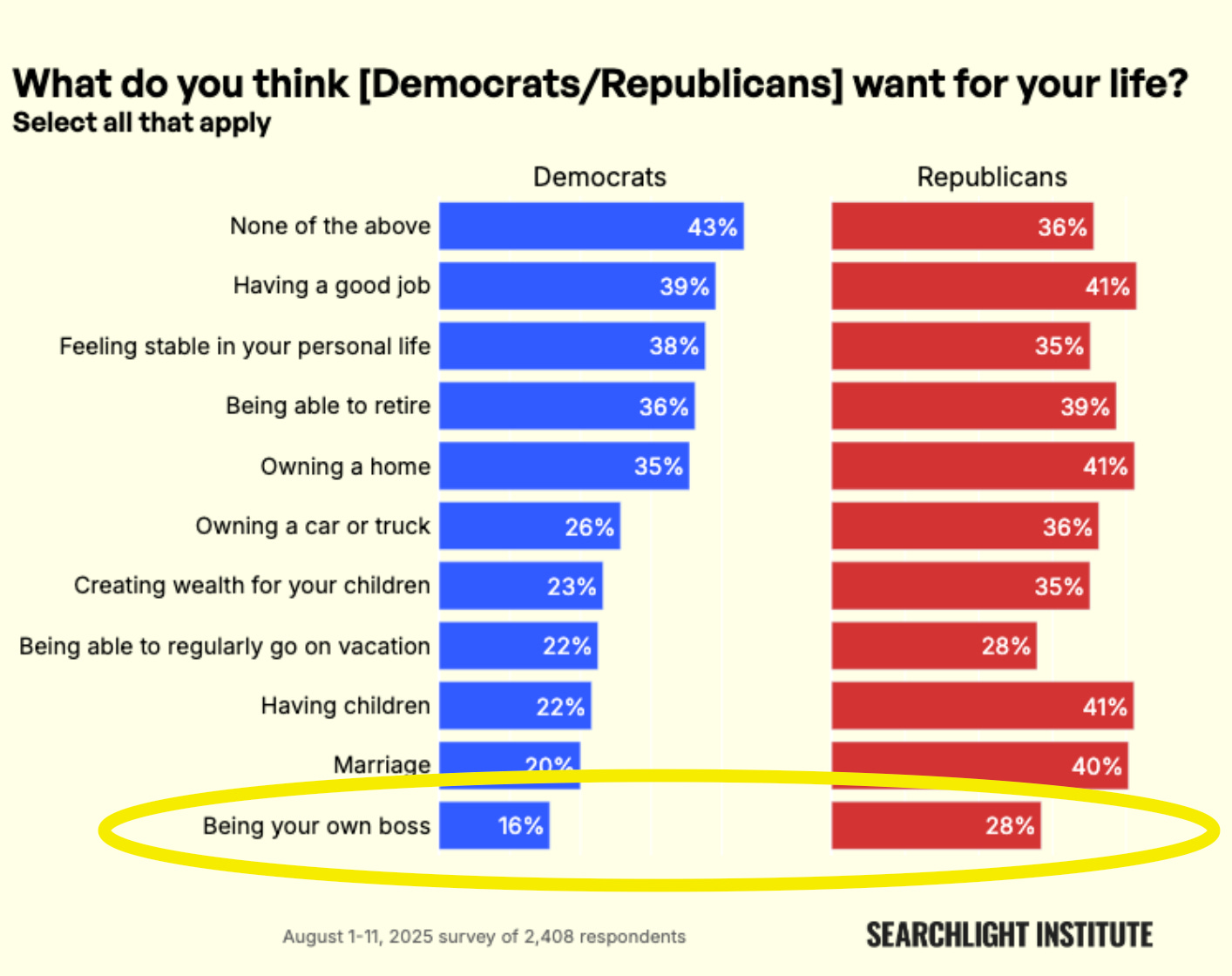A Way To Move Forward
Americans are divided on a lot of things, but not on the desire to be our own bosses—or on the need for both political parties to protect that freedom.
Add me to the list of everyone, all around the country, who is trying to fully understand the scope of last night’s election results. Here’s the clearest data point that I can see right now from where I sit in New Jersey:
Put another way, New Jersey gubernatorial candidate Jack Ciattarelli—who laid out a step-by-step plan to stop freelance busting—ran a campaign that would have worked if all the pollsters had been correct about the state of the electorate being largely what it has been in recent years.
But every single pollster turned out to be wrong about the state of the electorate:
Except for one pollster: Zogby, which got it right. But that didn’t happen until Election Day Eve, when Zogby dropped this bombshell that everyone (including many Democratic operatives and pundits) thought was just plain crazy, given what an outlier it was compared to all the other polls:
What all of this says to me is that Governor-elect Mikie Sherrill’s anti-Trump campaign worked better than most everyone expected. The chessboard did not just change. It flipped fully off the table, sent pieces scattering everywhere, and smacked more than a few “political experts” in the eye. It feels as if only a single piece was left standing where most people thought it was in the first place.

The thing is, this anti-Trump sentiment that seems to have dominated yesterday’s election has nothing to do with the need for reasonable labor and employment policy here in the State of New Jersey.
Especially at a time when an ongoing public-comment process makes clear that 99% of these same voters know what our state has been doing to independent contractors is just plain wrong.
What Has Changed
A lot of things changed on the chessboard of this policy battle yesterday:
It appears the Democrats have gained a veto-proof supermajority in New Jersey’s Assembly. That’s what conditions were in California when all the really intense freelance busting began, along with the push for sectoral-bargaining legislation.
Sherrill campaigned on a promise to “expand workers’ collective bargaining rights,” which is the language that has always underpinned freelance busting. This whole philosophy had been weakened by the massive public pushback against the proposed independent-contractor rule at the Department of Labor & Workforce Development.
However, Sherrill did also tell the New Jersey Business & Industry Association that: “Businesses are worried that they are going to go under because of this. I’ve heard from truckers who are saying, ‘I’m afraid I’m going to lose my job.’ That’s not what we want to see under this proposal. I’m going to review this when I get into office and have both businesses and workers at the table as we make sure regulations can help grow business and keep people employed.” The question today is whether this philosophy or the other one she expressed will prevail.
Leaders in various industries are now even more frightened about whatever the Labor Department and the New Jersey Legislature might do next. That means—again, the same as in California—it’s likely to become every profession for itself in a viciously unfair battle for single-industry exemptions to overall bad policy. Professions with big-money lobbyists are positioned to save themselves through preferential treatment. Everyone else is poised to lose their incomes and careers, and businesses that work with independent contractors are sitting ducks to take a hit, as California’s outcome has clearly demonstrated as well.
We’re talking about an estimated 1.7 million New Jersey independent contractors alone who are in the crosshairs of this policy mess. And we already know from California’s outcome that what the freelance busters say will happen—that all kinds of new, unionizable jobs will be created if we restrict independent contracting—is the opposite of what will actually happen with our state’s workforce and businesses. Even the Labor Department itself says this policy plan will not create a single new job.
We already know that some powerful Democrats in Trenton understand these facts, based on how many of them have already raised their voices publicly against the proposed independent-contractor rule.
So to me, what hasn’t changed is just as important as what has changed, as we all try to find a way forward to fix this policy mess.
What Hasn’t Changed
What hasn’t changed is that the ability to be an independent contractor is not a partisan issue. It’s about policy that lets us all realize our nation’s promise of liberty and the pursuit of happiness. It’s about the fundamental freedom to earn a living that has existed in this nation since the day the United States was founded. When this issue is presented to people that way, there is almost 100% agreement that the freedom to be independent contractors should be protected.
What hasn’t changed is that two-thirds of Americans still say they’d prefer to be their own boss, all other things being equal. This is still the preferred pathway to achieve the American dream.
What hasn’t changed is that fewer than 1 in 10 independent contractors would prefer a traditional job. That means nearly 1.7 million New Jerseyans don’t want to lose their current way of earning income, and they’re going to react with outrage toward lawmakers who cause or allow that to happen.
What hasn’t changed is that 99% of New Jerseyans who have weighed in as part of the public-comment process are united in opposition to independent-contractor policy that threatens the ability to be our own bosses.
And most important, perhaps: What hasn’t changed, according to this survey last month from a Democratic-leaning think tank, is that neither party’s voters believe their own party supports our freedom to be our own bosses:
What hasn’t changed is the reality of who we are, and what this policy battle is about at its core, and the fact that we need both political parties to do a much better job of standing with self-employed people, and with those who wish to be self-employed.
As strong as Democrats are feeling this morning in New Jersey and nationwide, they actually have an even bigger opportunity to grow and energize their base if they welcome independent contractors into their fold.
Democrats who have already spoken out in New Jersey about wanting to protect independent contractors are correct on the policy—and we need them to raise their voices even louder now.
I see a bipartisan way forward within this political reality to fix the independent-contractor policy problem, if we can get just one thing to happen next.
Democrats need to demonstrate a willingness to give independent contractors a meaningful seat at the table. It’s not just just the right thing to do and what the vast majority of people want. It’s also an opportunity for them to solidify the political gains they achieved last night and to build upon them.
Protecting our fundamental freedom to earn a living is not a partisan issue.
Never has been, never will be, no matter which direction the game flips next.






As always, an incredibly cogent and intelligent piece. We desperately need reasoned, sane voices like yours: Voices that rise above the perpetual partisan noise with calm, principled, but powerful rhetoric. That is especially true as we come to potential crossroads like these.
I hadn't seen the Zogby poll, and you can count me as one of the shocked masses at the size of the gap (even though generally I'm not surprised at Democrats winning most of the night; I warned Republicans after Trump won that they were going to lose the 2026 mid-terms, and some of the same factors apply here). I wonder how much of this comes down to polling models' historical penchant for underestimating single-issue voter turnout in off-year or mid-term elections? Don't get me wrong: Democrats definitely outperformed all expectations across the board. Even in my overwhelmingly Republican Western Pennsylvania borough, the Republican candidates for local offices barely won. I'm just not quite sure entirely what to make of the trend yet.
As an authoritarianism researcher, I appreciate anything that highlights the important values Americans have in common (across party lines). Freedom to be one's own boss still seems to be one of them. I hope the optimistic note in your piece rings true, and that Democrats do come to the table here and support this bipartisan and fundamentally American cause. Frankly, the whole country could use a saner Democratic party. Personally, based on some of the other election results around the country and the general tenor of the national party leadership, I'm not holding my breath...but I was heartened by your piece.
Thanks for all you do to fight the good fight!
Addendum: There was apparently a Sherrill super PAC poll on Oct. 24 that also was correct. It got so little attention in New Jersey because it was such an outlier that I didn't even know it existed until the day after Election Day, when I wrote this article. You can view it here: https://x.com/HoldsworthJen/status/1981779937091813707